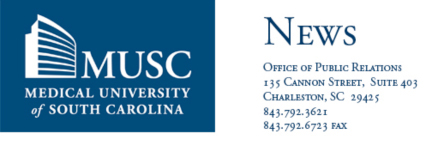
August 14, 2009
CHARLESTON -- Despite a challenging economic environment and increased competition for federal and corporate research dollars, biomedical research at Medical University of South Carolina (MUSC) continues to accelerate with external funding awards topping $217 million in fiscal year 2009.
The record funding includes more than $103 million from the National Institutes of Health (NIH) and surpasses the previously held record set in fiscal year 2008 by $15 million. Among the university’s notable achievements is the National Cancer Center designation of the Hollings Cancer Center this past year.
"The continued growth of the research programs over the last few years is a tremendous achievement by the MUSC team and reflects the special commitment of talented faculty and individuals across all aspects of our organization," said Stephen M. Lanier, Ph.D., MUSC Associate Provost for Research and pharmacology professor.
"This achievement is a tangible demonstration of the determination and resourcefulness of our talented faculty and staff, who deserve congratulations and praise for a job well done," said John Raymond, M.D., MUSC Vice President of Academic Affairs and Provost. "The achievement is all the more remarkable in that it came at a time of unprecedented financial challenge. Additionally, we should acknowledge the critical role that the South Carolina Legislature has played in supporting the Centers of Economic Excellence (Endowed Chairs) program, which has allowed us to recruit world-class scientists to MUSC; many of those scientists have contributed to our research growth."
With the current economic struggles, the growth in the research programs is an important stimulus for the regional economy as new faculty and staff move to the area and additional jobs are created to carry out the research.
According to Lanier, the Charleston Innovation Center, a new company laboratory incubator developed through a partnership with the South Carolina Research Authority, the City of Charleston and MUSC, will serve as another important platform for the area’s growth in biomedical sciences.
With support of the South Carolina Research Infrastructure Act, MUSC began construction of a 100,000 square foot Drug Discovery Building and a 96,000 square foot research building for programs in cancer genomics and bioengineering that will serve as the home of the South Carolina Bioengineering Alliance. The bioengineering building will house faculty and students from MUSC, USC and Clemson as part of the Alliance. These research facilities will also bode well for continued growth in the biosciences.
The FY09 research funding numbers do not include major research funding awards recently announced in July, including a major $20 million grant from the NIH to the South Carolina Translational Research Institute, with Kathleen Brady, M.D., Ph.D., at MUSC as the lead investigator, and a $20 million Research Infrastructure Grant from the National Science Foundation for biofabrication awarded to South Carolina with Roger Markwald, Ph.D., at MUSC as the lead investigator. Dr. Lanier commented, "These programs, along with the sustained contributions in cardiovascular research and the dramatic growth in neurosciences, which is one of the best programs in the world, provide a strong foundation for continued growth in MUSC biomedical research."
MUSC President Ray Greenberg, M.D., Ph.D., added, "The people of South Carolina can be very proud that cutting edge research is taking place in their state, which will improve health, create jobs, and provide for a brighter future for all our citizens."
About MUSC
Founded in 1824 in Charleston, The Medical University of South Carolina is the oldest medical school in the South. Today, MUSC continues the tradition of excellence in education, research, and patient care. MUSC educates and trains more than 3,000 students and residents, and has nearly 11,000 employees, including 1,500 faculty members. As the largest non-federal employer in Charleston, the university and its affiliates have collective annual budgets in excess of $1.6 billion. MUSC operates a 750-bed medical center, which includes a nationally recognized Children's Hospital and a leading Institute of Psychiatry. For more information on academic information or clinical services, visit www.musc.edu or www.muschealth.com.
#####